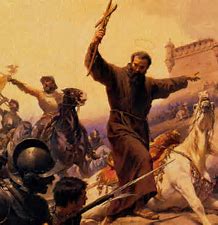
JULY 22 is the traditional memorial of ST. LAURENCE OF BRINDISI (+1620).
The son of Venetian merchants William and Elizabeth Rossi, he was born in Brindisi, the Kingdom of Naples on July 22, 1559. His given name was Giulio Caesar de Rossi (Julius Caesar Rossi). His parents died when Giulio was still very young and he was raised by his uncle, who gave him a fine education. He realized how brilliant and pious the child was.
Giulio studied with the Conventual Franciscans. Then he went to St. Mark’s College in Venice, and, the University of Padua for further studies. He not only learned philosophy and theology. He became fluent in ten languages including his own Italian. Giulio joined the Capuchin Franciscans, taking the name Lawrence. By 23, he was ordained.
One of the first things Fr. Lawrence did was preach to anyone. He was succinct and easy to understand. A brilliant, compassionate man with great administrative skill, at 31, he became the superior of the Capuchins in Tuscany. He worked as a missionary. His gifts of persuasion and appreciation of the needs of others led many secular and religious leaders to call upon him to grace the pulpits of churches all over Europe.
Within 6 years, Lawrence was commissioned by Pope Clement VIII to work for the conversion of the Jewish people and combat the spread of Protestantism in Europe. His Hebrew, German, Bohemian and French were so perfect that Jewish rabbis thought he was a Jew who had converted to Catholicism. The same year, he became the definitor general to Rome for the Capuchins.
Three years later, to further work his work combating Protestantism, he established Capuchin monasteries in Germany and Austria. These helped reconvert many Protestants.
Lawrence’s self-discipline and appreciation for the needs of others led him in a different direction. He became imperial chaplain for the army of Rudolph II, the Holy Roman Emperor. Europe was preparing for war. Lawrence recruited Phillip Emmanuel, Duke of Mercoeur to fight against the Ottoman army. They beat an overwhelmingly larger army. In a remarkable feat, St. Lawrence lead an army of 18,000 with only a cross in his hand during the liberation of Szeksfehervat, Hungary. He stayed on to try to negotiate Europe’s way out of the Thirty Years War.
In 1602, Lawrence became vicar general for the Capuchins for 3 years. He would not accept the offer to be reelected in 1605. After that, he served as papal nuncio to Bavaria and to Spain.
Lawrence retired to Naples in 1618. Shortly after he was recalled as special envoy to King Philip III of Spain regarding the Viceroy of Naples, who was oppressing the people. Naples was his home. He was concerned. During the visit to Spain, he went to Lisbon, Portugal and died on his 60th birthday, July 22, 1619.
Fr. Lawrence was entombed in the Poor Clare Convent of Annunciation in Villafranca del Bierzo, Spain.
Despite the great work Fr. Lawrence did for Vatican politics, his greatest accomplishments were his evangelizations. He wrote a total of 13 volumes of parchment which are archived in the order’s library. They were republished in the 1926 as 15 volumes.
Fr. Lawrence was canonized August 12, 1881 and declared a Doctor of the Church by Pope John XXIII in 1959.

Recent Comments